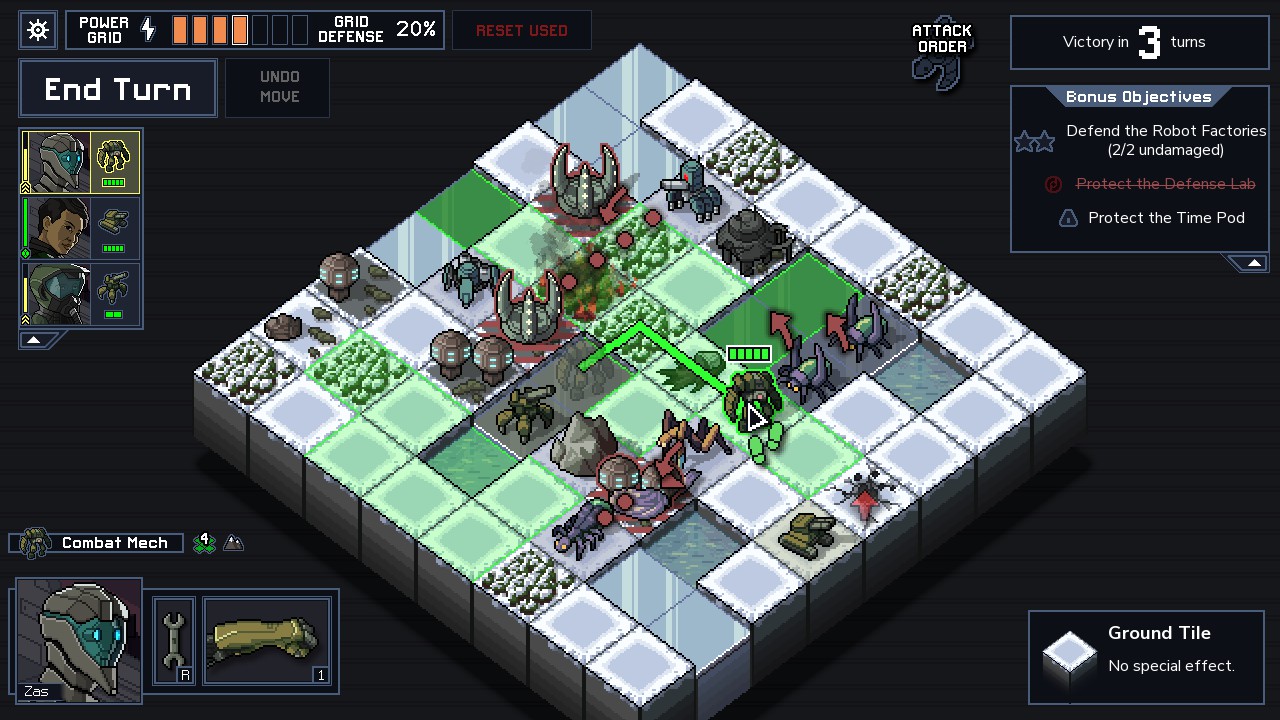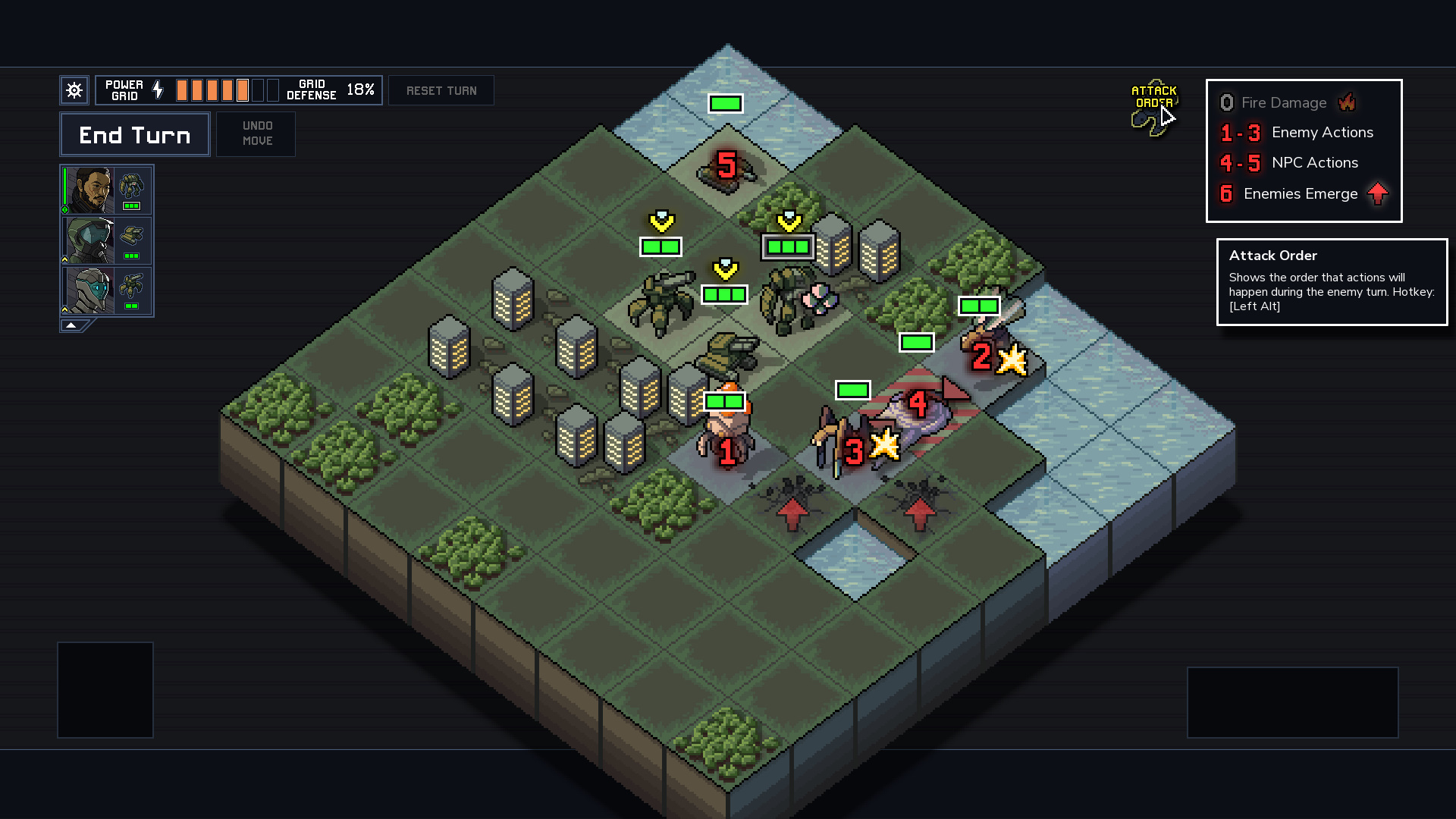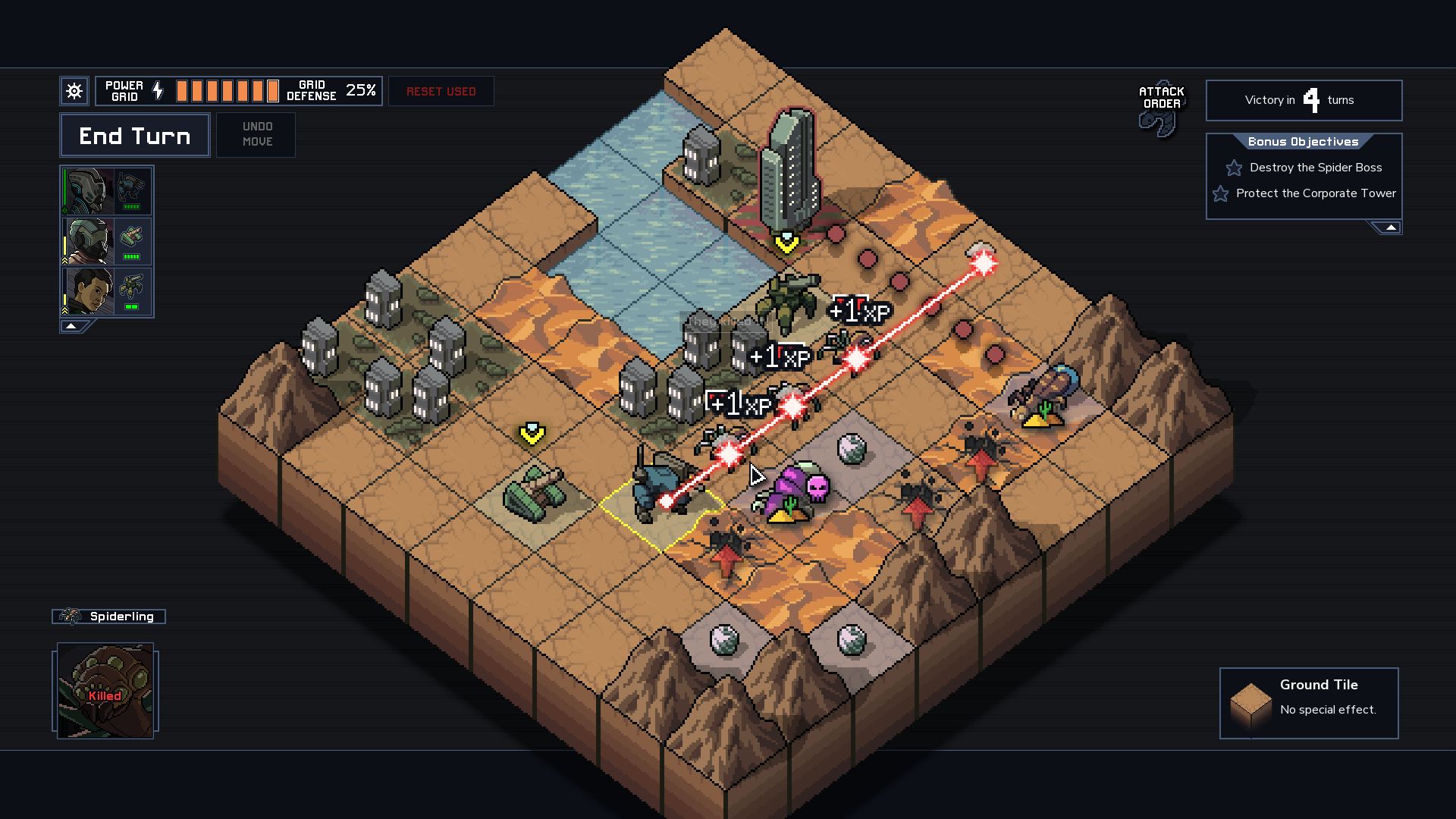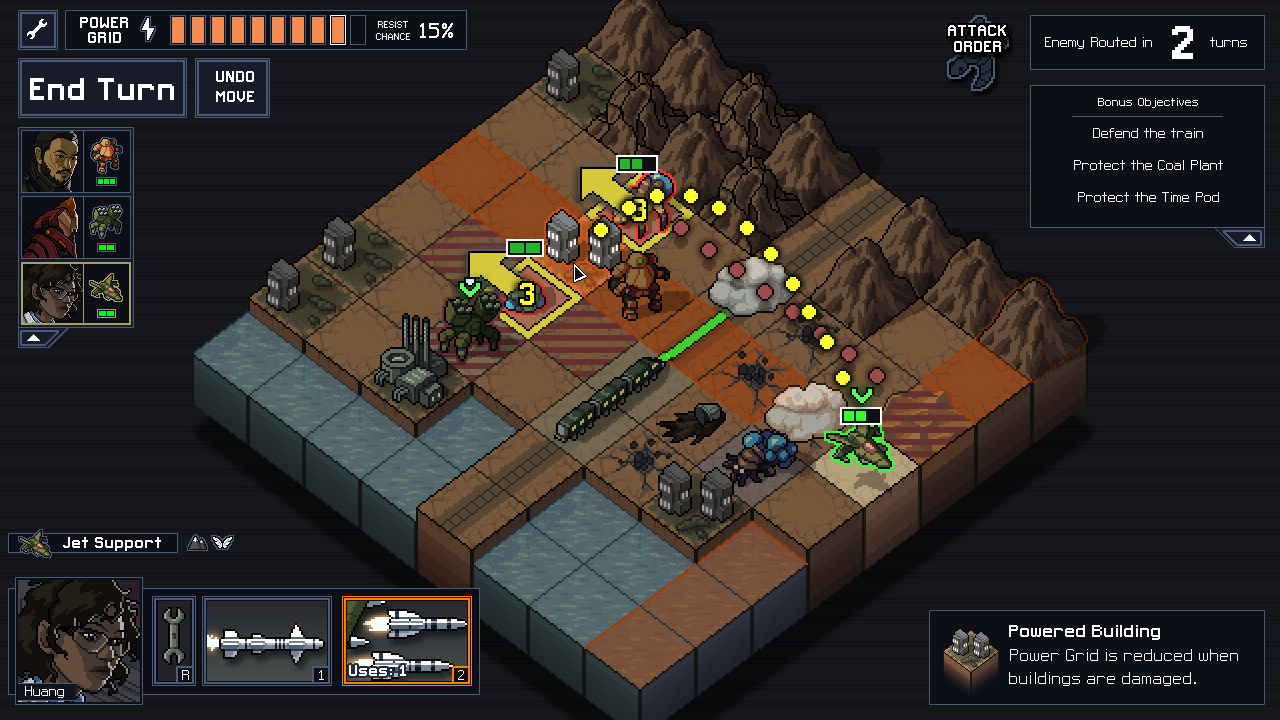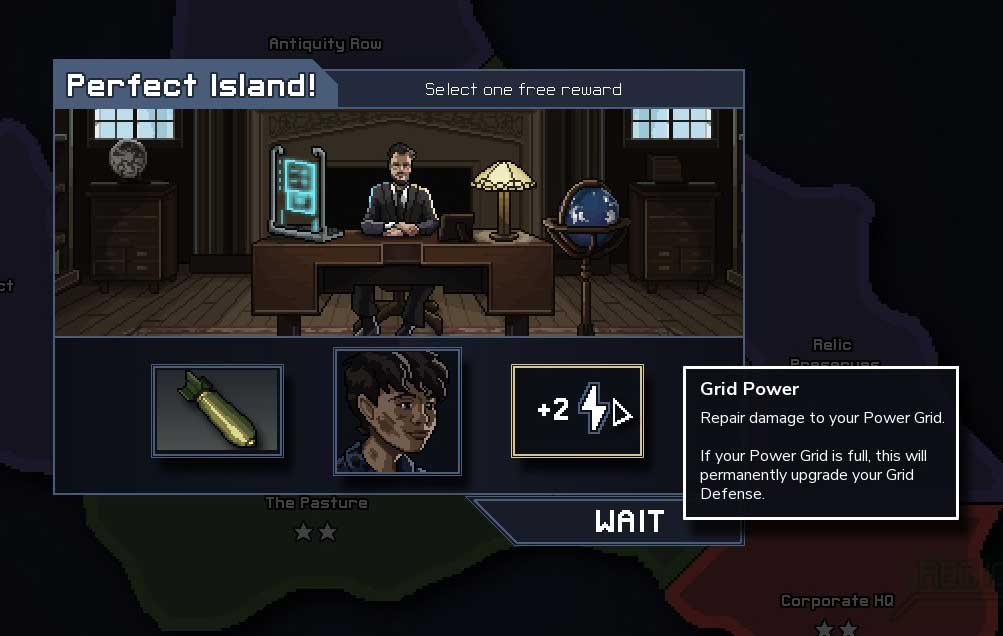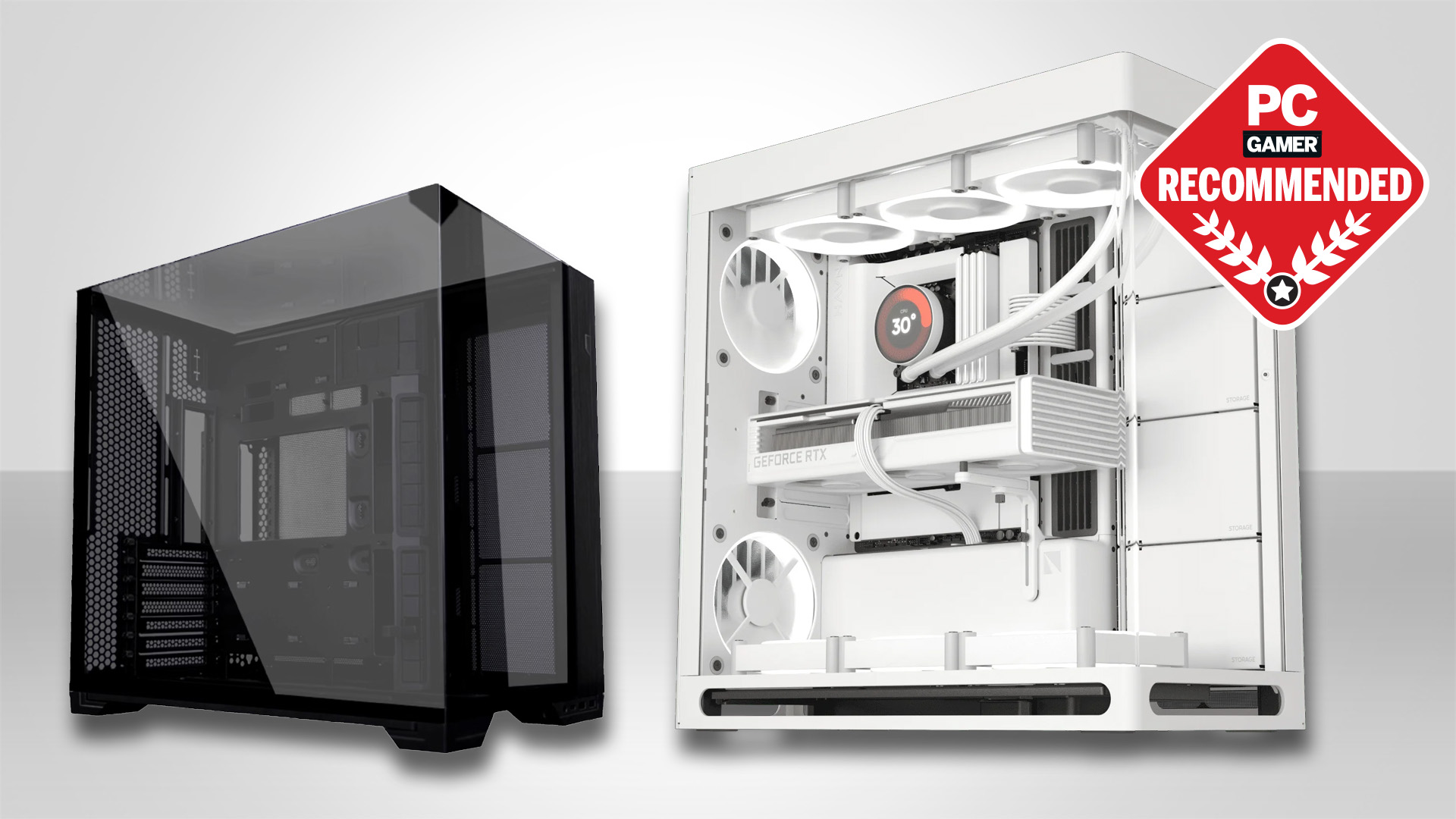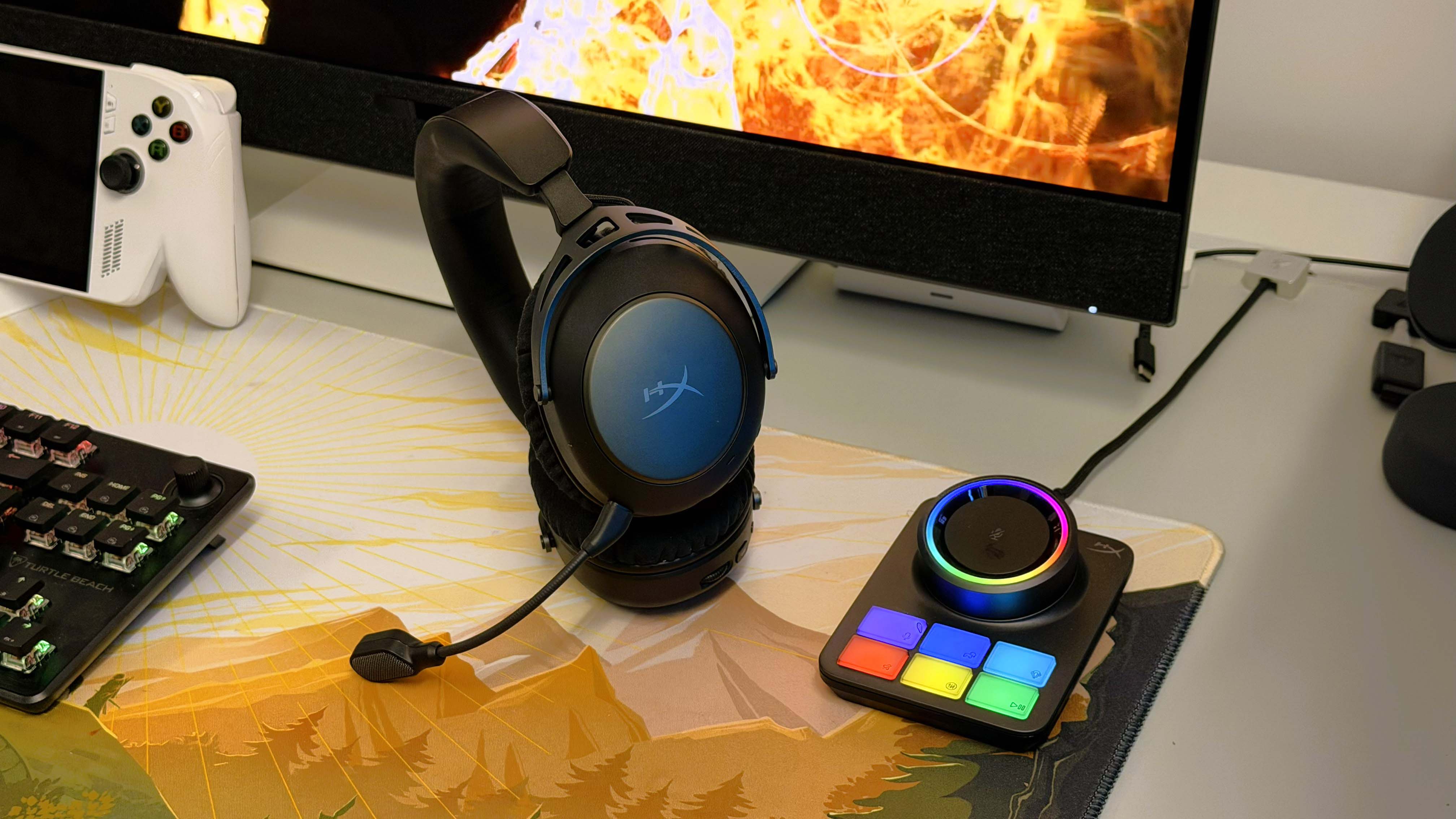6 essential tips for Into the Breach
How much does Power Grid really matter, and what should you upgrade?
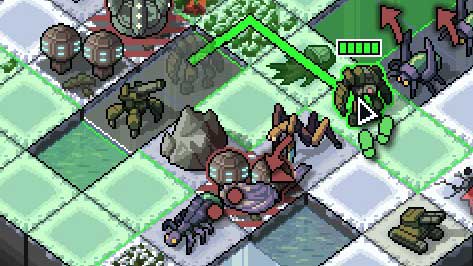
Our review calls Into the Breach a challenging and intensely rewarding strategy game. We love its oppositional smallness and depth, the way it allows you to make mistakes but make every move feel critical.
The eight unlockable squads let you attack Into the Breach in totally different ways—like using judo or swashbuckling to defend Earth. Despite those strategic differences, there's still a ton of shared tips and information worth knowing. Here's the stuff we'd send new players into battle with.
Above: A deeper look at what we love about Into the Breach.
Key tips
Prioritize earning Reputation
Of the three types of rewards you can get for completing missions, Corporation Reputation is the one you should aim for. Not only can it be spent on valuable weapons and power cores after you've cleared an island, but it can also be used to buy Power Grid directly—making it more versatile than hoarding plain Power Grid alone. It's far more advantageous to stock up on reputation when choosing missions and only go for the ones that award Power Grid if you're getting uncomfortably low and don't think you'll survive long enough to unlock the store. Power cores are also rarely rewarded, but often spike the difficulty of a mission so it's up to you to determine if it's worth the risk.
Get the siege mech upgrade that negates building damage
A Vek is attacking a building. You can kill it, but smashing it with your melee mech would shove it into a civilian building, incurring casualties. One of the easiest ways to get out of this common situation is with upgrades that allow your artillery pieces to deal zero damage to buildings. Consider making this your first power core investment.
Like chess, control the center of each map
Despite all the giant aliens and mechs, Into the Breach shares a lot of DNA with chess. And just like chess, you should always strive to control the center of each map. While years of strategy gaming might lead you to believe your ranged siege mechs are better in the back, you're severely restricting their ability to project damage by only allowing them to fire in one direction. Instead, keep your group huddled around the center, where it can easily move to the outskirts to defend any buildings the Vek might attack. If keeping your more fragile mechs out of harm's way is a concern, you can always give them a nice HP boost with a power core.
Don't worry too much about mech HP (or death)
HP is a resource, and you should spend it to win. Don't be afraid to absorb lower-damage hits, step in fire, or block a Vek. Likewise: dead mechs are never destroyed, they're just at 0 HP. If you have a passive ability that can heal them, they'll reboot without their pilot and can continue fighting. As for pilots, losing one can sting but is hardly a game-ending loss. Whether you win or lose, you can always send one pilot back in time to start a new game which lets them retain all of their experience and unlocked abilities. This is your primary pilot who you should always aim to protect. Because you can only send one, the other two pilots on your team are largely expendable.
Keep up to date with the most important stories and the best deals, as picked by the PC Gamer team.
Press Alt to check the order of attack
Positioning one Vek to kill another is an obvious play, but be sure to check out the attack order first to understand who goes first—especially if you're trying to stop a Vek from attacking a building by killing it with another one first.
Pick the right pilot for your team
Each mech can be piloted by a soldier that, as they level up, unlocks new passive abilities. At the start of each campaign, you can choose one of several pilots that already have one passive trait unlocked. For beginners, Abe Isamu is a great choice because his mech becomes armored, letting him ignore one point of damage from attacks (but not damage from other sources like being pushed). Early on, you can effectively use Abe like a tank to soak enemy damage and block cheap shots at your buildings. If you're bad at planning, Isaac Jones gives you another free turn reset each battle. Finally, more advanced pilots require power cores to use their abilities, meaning they won't be useful until later in a campaign. These are best left for more experienced players.
Other stuff to know
You can overcharge your powergrid to increase your defense
If you fill out your Power Grid meter, each addition piece of Power Grid will increase the percentage chance that a building resists enemy damage entirely. It's a nice to have bonus, but not reliable so don't hoard Power Grid over corporation reputation.
Take advantage of the whole 'time travel' thing
Once per battle you can reset the entire turn, letting you undo a royally dumb decision. It's always a good idea to use this if you mess up or if you realize a more efficient play (for XP, HP, or saving a time pod) you can make instead.
Everything but powergrid is disposable, sacrifice a pilot if you have to
When push comes to shove, you always want to prevent the Vek from attacking a building. If you have plenty of power grid to spare, losing one or two in a battle isn't so bad, but when things are dire don't be afraid to sacrifice mechs and your non-primary pilot.
Make all your moves first, then act
Like chess, it's helpful to walk through your attacks and their resulting consequences before actually acting. You can use the undo button as many times as you want to move your mechs around, but once you initiate an attack there's no going back. Only once you've devised a plan of action that does the most potential damage and saves any targeted buildings should you finally start making moves.
Plan each turn with your weakest weapon in mind
Weapons like the Gravity Mech, which does no damage and only pulls a target one tile forward, seem pretty weak at first glance. But instead of using them on their own or as an afterthought to your more powerful attacks, build your entire attack plan around them. You'll be surprised how much more useful they become.
Use friendly fire to push your own mechs into or out of danger
Because mech HP is renewable, don't hesitate to use friendly fire to manipulate the positioning of your own mechs. Sometimes all they need is a little push to get them that extra distance to thwart a Vek attack on a building. Likewise, you can also push them away from an enemy attack to let them fight another turn.
Don't block too many Vek from spawning, as you'll make later turns even harder
By positioning one of your mechs or an enemy vek over top of a spawn point, you can prevent more enemies from joining the battle at the cost of HP. But being too aggressive about preventing reinforcements can create a nightmare in later turns when you have six Vek on the field. It's better to kill a Vek than to block reinforcements, so focus on that first.
Events like seismic activity happen before Vek can attack, so don't waste effort killing Vek that are on these tiles Likewise, environmental attacks like seismic activity or volcanic eruptions happen before any of the Vek can make their attack. Don't bother wasting time killing Vek if they're already standing on a tile marked with one of these environmental hazards.
If you complete every objective on an island, you earn a bonus
Achieving a "Perfect Island" earns a free reward that you select before spending Reputation. In the image above, we were offered a great weapon, pilot, or two free Grid Power.
Shields don't prevent damage from insta-kill abilities like mines or seismic activity
Once in a while, you might find your mech sporting a protective shield that negates incoming damage. It's great for blocking an attack, but won't work against mines or environmental hazards that instantly kill a unit instead of dealing a set amount of damage.
Power cores can be reused, so assign them to HP while you save up for a more powerful use
Don't let power cores sit in your inventory unused. Assign them to mechs and use them to boost their move distance or HP and then, if you buy a powerful weapon you need to activate, you can always repurpose them later.
With over 7 years of experience with in-depth feature reporting, Steven's mission is to chronicle the fascinating ways that games intersect our lives. Whether it's colossal in-game wars in an MMO, or long-haul truckers who turn to games to protect them from the loneliness of the open road, Steven tries to unearth PC gaming's greatest untold stories. His love of PC gaming started extremely early. Without money to spend, he spent an entire day watching the progress bar on a 25mb download of the Heroes of Might and Magic 2 demo that he then played for at least a hundred hours. It was a good demo.
